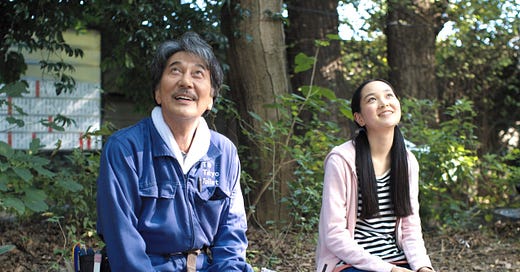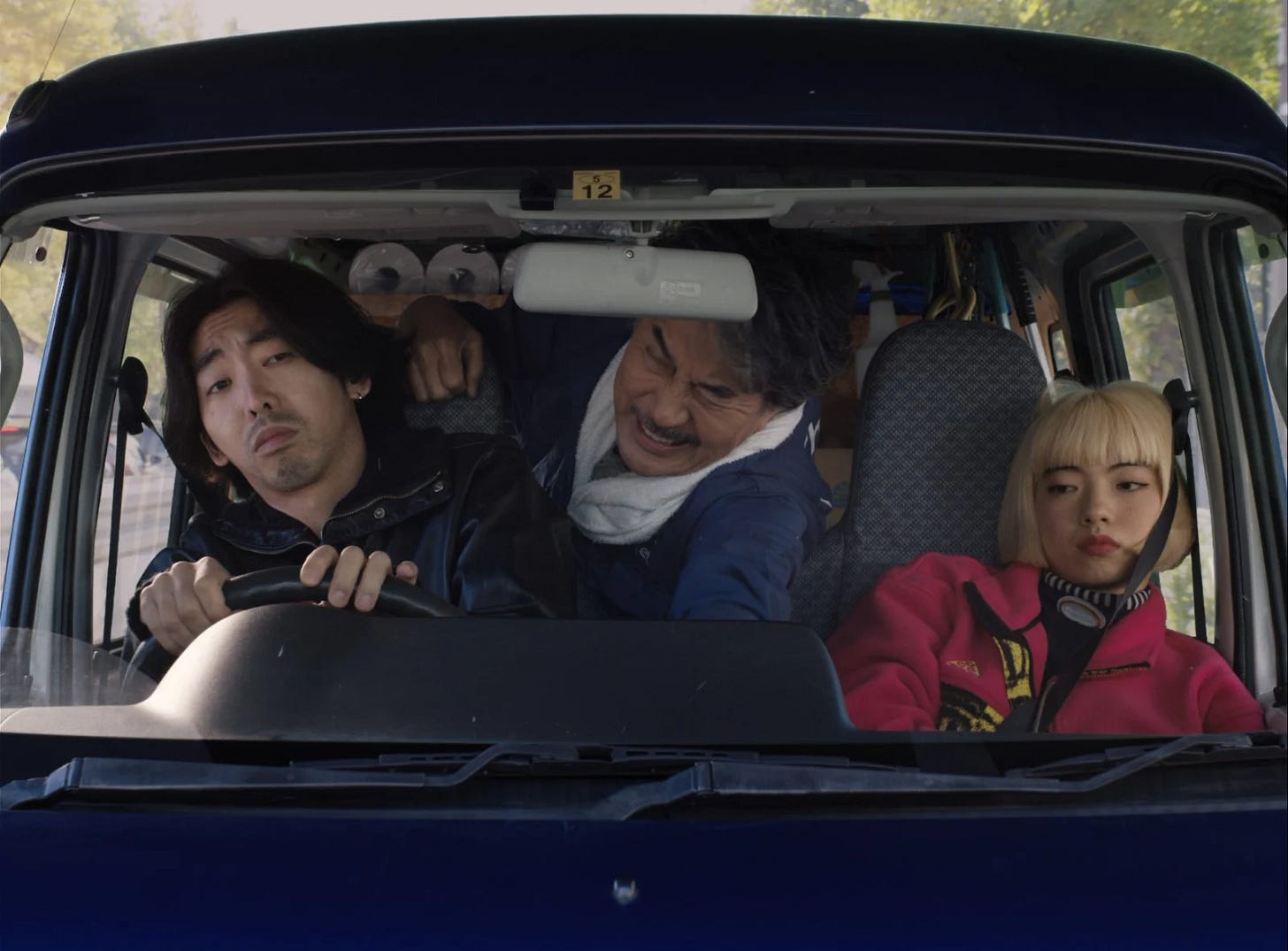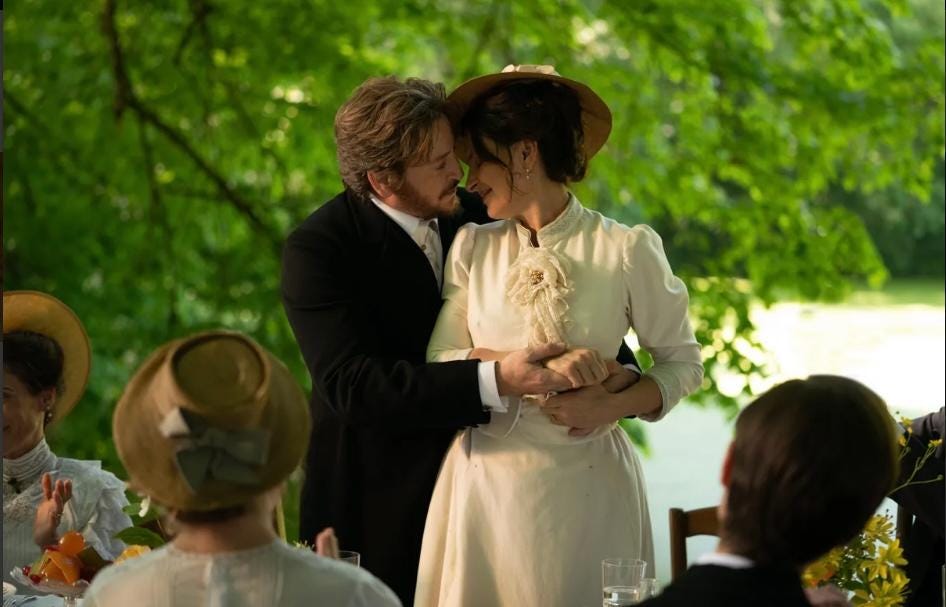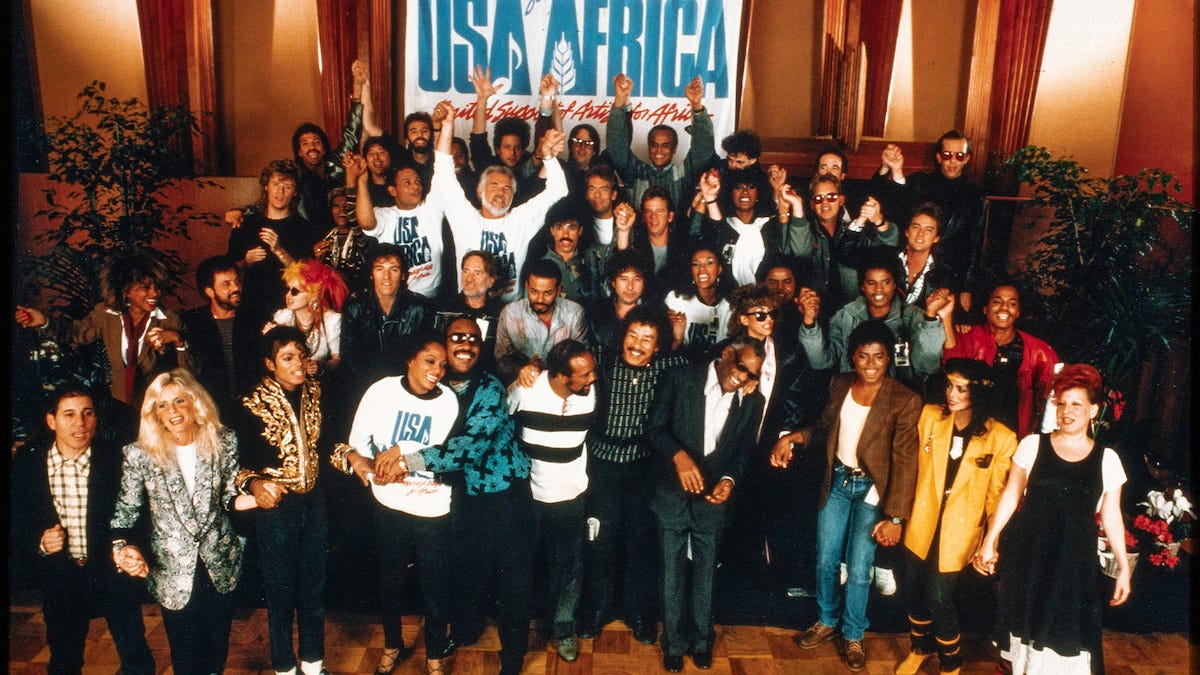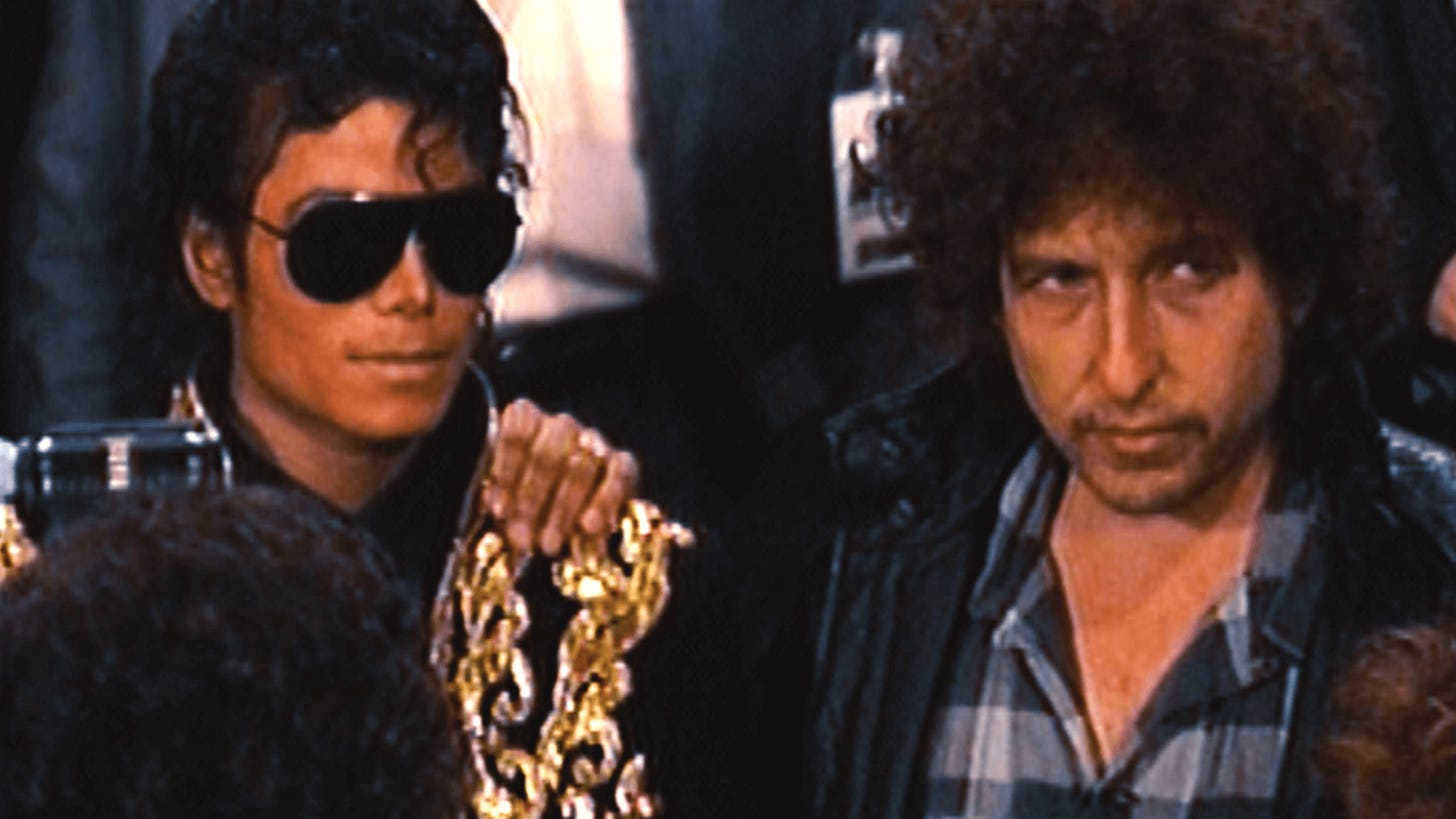What to Watch: Whim Vendors
"Perfect Days" and "The Taste of Things" in theaters; "The Greatest Night in Pop" on Netflix.
Two of 2023’s finest movies — #2 and #13 on my year-end Top 20 — open in New York and L.A. today and roll out to other cities and theaters over the next two weeks. “Perfect Days” (⭐ ⭐ ⭐ ⭐, opening in Boston February 22), a nominee for the Best International Film Oscar, is about as close to a perfect movie as they come: Simple, sincere, attuned to the mysteries of the cosmos and civic plumbing alike. It’s also arguably Wim Wenders’ best outing since the eternal “Wings of Desire,” although there’s a lot of filmography between the two that I should be more familiar with. (Now that the director is heading into his 80s, it might be a good time to reckon with a career that’s in its sixth decade.)
“Perfect Days” is about an aging Tokyo-ite named Hirayama (Kōji Yakusho) who lives by himself and works as a toilet cleaner in the city’s Shibuya district. Every day he rises, puts on his blue work suit, trims his mustache, mists his plants, gets in his van, pops in a cassette of one of his favored artists (Otis Redding, Patti Smith, The Kinks, Nina Simone), and drives to a series of public facilities that double as installation art. (“Perfect Days” got its start when Wenders was invited to consider the Tokyo Toilet Project – 17 bathrooms designed by a cadre of international architects – as the inspiration for a series of short films; instead, he made one long feature.)
Hirayama has a co-worker, Takashi (Tokio Emoto), a goofy young man with a girlfriend, Aya (Aoi Yamada), who’s way out of his league. Other figures drift in and out of Hirayama’s days: An old lady sweeping the street outside his house, a young woman lunching on the next park bench over, a homeless man played by the actor-dancer Min Tanaka. A rebellious teenage niece (Arisa Nakano) drops by for a few days, and when her mother (Yumi Asō) comes to collect her in a chauffeured limousine, we glimpse a world from which Hirayama has either exiled himself or been exiled. Most likely the former. In his quietude and boundless curiosity, his pantheistic worship of trees and his total absorption in the task at hand, Hirayama is like the Buddhist cook who achieves enlightenment yet returns to spend his days in the kitchen, serenely unseen.
So, yes, this is a movie that pushes the buttons of a wooly-headed old Zen-boy like myself, and the fact that Wenders is consciously working in the spirit of the great Yasujiro Ozu – whose world he addressed in the 1982 documentary “Tokyo-ga” and whose bone-deep humanism he shares – makes me even more of a sucker for a spare late-inning masterwork such as this. (You could argue, as The New Yorker’s Richard Brody does, that Wenders lacks Ozu’s tartness and eye for social observation; I’d agree with the former – the German filmmaker is and always has been a deadpan sentimentalist – and hazard that the latter doesn’t apply, since Wenders’s concerns tend toward the spiritual, while Ozu is nothing if not earthy.)
Among other things, “Perfect Days” is a companion piece to and near-mirror image of Jim Jarmusch’s “Paterson” (2016), both films about working-class heroes who make art out of the repetition of their lives. Adam Driver’s bus driver in “Paterson” writes poetry, but Hiroyama is poetry, not consciously but in the rhyme of his days and the pentameter of their events. Only at the new film’s very end does he actually glimpse what he has been so successfully living, and this stoic, compassionate man is suddenly flooded with hilarity and tears. We should all be so lucky.
“Next time is next time; now is now,” Hirayama cheerfully chides the niece when she bugs him about a future visit , and the two chant it over and over again, laughing as they cycle down the road like refugees from the Ozu movie that’s always unspooling somewhere. Everything is the same. Every day is different. The film’s title comes from the Lou Reed song “Perfect Day,” which is heard repeatedly on the soundtrack. (Al Green came out with a gorgeous cover version last year; listen to it here.) The achievement of “Perfect Days” is to render the song’s wonder plural, to witness it fanning out to the horizon, and to invite us along for the ride.
By contrast, “The Taste of Things” (⭐ ⭐ ⭐ 1/2, opening in Boston February 14) is only the best food movie to come out since “Babette’s Feast” in 1987. Or maybe “Big Night” in 1996. Or whatever the film is that lights your taste buds all the way up to your central nervous system. It’s that kind of movie: rhapsodic with ingredients and the ways they can spill across a kitchen or dining room table, heady with the slow magic through which the raw becomes the cooked.
It stars Juliette Binoche because I guess it has to. She plays Eugénie, the long-serving personal cook for the renowned gourmand and restaurateur Dodin- Bouffant in 1880s France. (The film has been adapted from a 1924 novel by Marcel Rouff, who based his fictional epicure on his gastronome friend Curnonsky and the original French foodie Jean Anthelme Brillat-Savarin.) Benoît Magimel plays Dodin-Bouffant, and the fact that he and Binoche were life partners from 1998 to 2003, with a daughter between them, is germane to the film, which sees food and its preparation as the form of intimacy closest to physical love. The divide between master and servant has long since been whisked away, if it ever was present, and the time the two spend together in the sunlit country kitchen is silent, busy, and content. This is a marriage in everything but name, which is why Dodin-Bouffant decides he wants to make it official and why Eugénie decides that that would spoil everything.
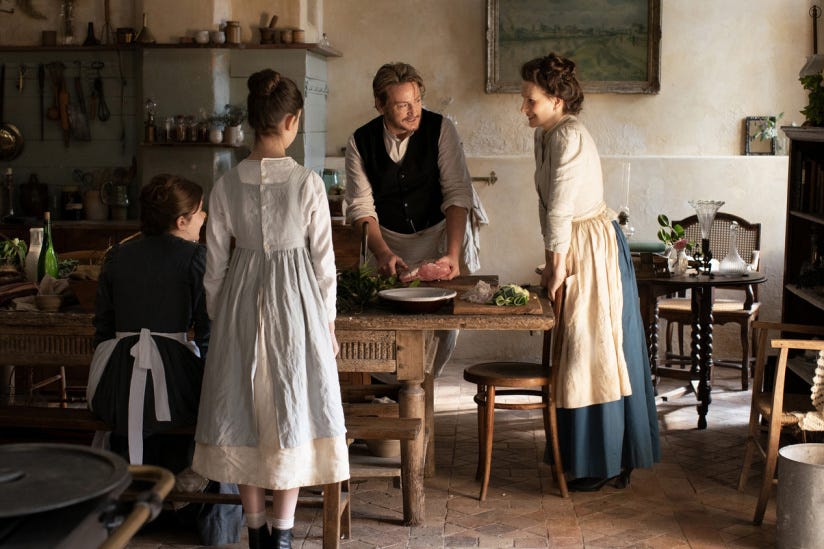
Writer-director Tràn Anh Hùng – his debut film was “The Scent of Green Papaya” back in 1993 – has a healthy sense of perversity, beginning “The Taste of Things” where most food movies climax: With the luxuriously attentive filming of a meal being made. The opening scene, 38 minutes in length, is nearly silent except for the chop of the knife and the sizzle of the pan, Eugénie attended by two young assistants, Violette (Galatéa Belugi) and Pauline (Bonnie Chagneau-Ravoire), the latter a solemnly beautiful adolescent with the palate of a prodigy. Loins of veal. Fresh langoustine. A ball of dough formed into a vol au vent: a bowl of puff pastry stuffed with steaming seafood stew.
Dodin-Bouffant is present, too, assisting the assistants and bearing witness to the creation; he’ll later enjoy the meal with his bourgeoise-bohemian male friends, but for now he’s a student in the operating theater. The movie acknowledges the inequities of class and gender, but it suggests that the master is a prisoner of his social conventions while Eugénie is freed by her art. Toward the end, with the preparation of a simple pot au feu, it’s implied a master might be liberated, too.
“The Taste of Things” is admittedly longer on food than on plot. In a way it’s a series of short stories in the form of meals, connected by observations of a relationship and the recreation of a vanished time and place. Its mode is one of quiet exaltation and its true subject is the place where the sensual and the sensuous merge into one. You might want to eat beforehand.
Depending upon your age and where you were in life during the mid-1980s, “The Greatest Night in Pop” (⭐ ⭐ ⭐, streaming on Netflix) may matter a lot to you or not at all. Still, as someone who thought the “We Are the World” single was impressive as a pop-culture event, useful as fund-raising philanthropy, and banal as music, the 97-minute documentary about its recording is a fascinating watch. To see so many varied and legendary musicians jostling against each other is simply a sight: Michael Jackson, Paul Simon, Stevie Wonder, Bruce Springsteen, Dionne Warwick, Diana Ross, Ray Charles, Willie Nelson, and 30 more, all corralled into Los Angeles’ A&M Studios on the night of January 28, 1985, by organizer Lionel Richie, producer Quincy Jones, and spiritual godfather Harry Belafonte.
What could have been chaos very nearly was. The recording session followed immediately on the heels of that night’s American Music Awards, which Richie hosted (and won in six categories), and it finished up close to dawn, with Ross among the last to leave, sobbing “I don’t want this to be over!” Cyndi Lauper’s solo was marred by mysterious clanking noises on the tape that turned out to be her jewelry. Al Jarreau hit the wine so hard that they made him record his part before he forgot it. Springsteen came straight from the final show of the “Born in the U.S.A.” tour with his voice in tatters.
And then there’s Bob Dylan, the only one of the participants who doesn’t seem exactly clear on why he’s there. Among other things, “The Greatest Night in Pop” serves as a reminder that everyone experiences Imposter Syndrome, even (maybe especially) the iconic pop stars of any given age. Lauper and Huey Lewis in new interview segments confess their insecurity at having been newbies in a room full of titans; Sheila E. says she felt the same until she realized the producers were using her as a placeholder to lure Prince. (He never showed and, feeling more than a little exploited, Sheila E. left mid-session.) Dylan – at a particularly fallow period in his career – looks dazed and out of place, and when his turn comes to record his solo lyric, he can barely muster a whisper. It takes Stevie Wonder sitting at the piano and singing the verse in Bob Dylan’s voice before the actual Dylan can find a way in by imitating him.
The interviews for the new film were shot in the recording studio where it all happened, with Richie choking up toward the end when he says “I think about this room as my house.” It’s clear that this was a remarkable feat of logistics, ego management, and the kind of idealism that affects famous people with a global reach. In footage from 1985, Ross talks about how “We Are the World” could even represent a turning point in the way people treat each other in the future, and we’ve seen how that worked out. But every generation has its great deeds as well as its naivete, and the $80 million the record has raised over the years for famine relief and social programs in Africa has saved and changed countless lives. The example it set for FarmAid, Live Aid, and other charity events is inarguable. All of that ain’t hay. Even if the song itself is pretty lame, it doesn’t actually matter. It has a hook and you can donate to it.
I also reviewed “Suncoast” (⭐ ⭐ 1/2, streaming on Hulu) for the Washington Post this week. It’s a nice if somewhat lumpy coming-of-age film about coping with family tragedy, adolescence, and assorted mishegoss, with a performance by Nico Parker that earned her an award at Sundance and the usual bulletproof acting from Laura Linney and Woody Harrelson.
Comments? Bring it.
If you enjoyed this edition of Ty Burr’s Watch List, feel free to pass it along to others.
If you’re not a paying subscriber and would like to sign up for additional postings and to join the discussions — or just help underwrite this enterprise, for which the author would be eternally grateful — here’s how.

